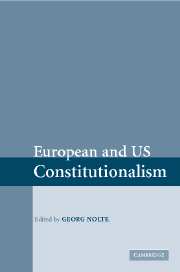Book contents
- Frontmatter
- Contents
- Preface
- PART I Introduction
- PART II Freedom of speech
- 2 Freedom of speech in Europe
- 3 Freedom of expression adjudication in Europe and the United States: a case study in comparative constitutional architecture
- Comment
- Comment
- PART III Human dignity
- PART IV The protective function
- PART V Adjudication
- PART VI Democracy and international influences
- Index
2 - Freedom of speech in Europe
from PART II - Freedom of speech
Published online by Cambridge University Press: 13 August 2009
- Frontmatter
- Contents
- Preface
- PART I Introduction
- PART II Freedom of speech
- 2 Freedom of speech in Europe
- 3 Freedom of expression adjudication in Europe and the United States: a case study in comparative constitutional architecture
- Comment
- Comment
- PART III Human dignity
- PART IV The protective function
- PART V Adjudication
- PART VI Democracy and international influences
- Index
Summary
Freedom of speech has a prominent place in both the European and the US constitutional order and the changes since the 1960s in the judicial interpretation of this freedom have been substantial. Half a century later it is time to assess the legal evolution on both sides of the Atlantic; to note differences and convergences and to link them to deeper historical, political and social trends.
This contribution is divided into two sections. The first section (I) examines the impact of two major developments in Europe since the 1950s on freedom of speech, the spread of judicial review and the creation of a system of European law, namely the European Convention on Human Rights with the case law of the Strasbourg court, and EC-EU law with the case law of the Luxembourg court. The second section (II) studies freedom of speech in Europe, in particular areas of political speech (1), libel of officials and of public figures (2), as well as personality rights and privacy (3). Comparisons with US-American constitutional law will be made as we go along.
The development of judicial review and its impact on freedom of speech
Judicial review
The creation and the development of judicial review represents one of the most important changes in the legal and political history of European countries since 1945. Starting in Western Europe, in countries such as Germany, France, and Italy, it has spread since the 1990s to Central and Eastern European countries.
- Type
- Chapter
- Information
- European and US Constitutionalism , pp. 23 - 48Publisher: Cambridge University PressPrint publication year: 2005
- 3
- Cited by

